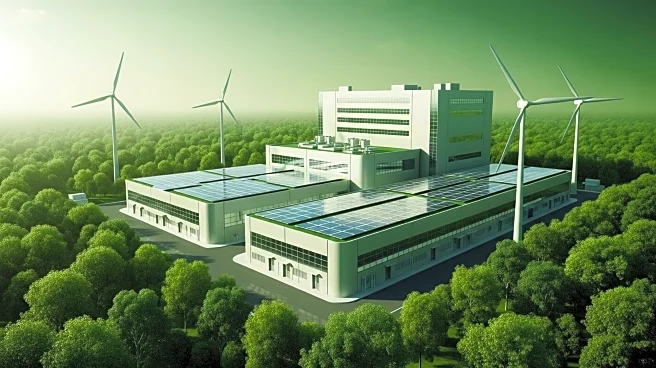What's Happening?
The semiconductor industry is undergoing a significant transformation towards sustainable manufacturing practices, driven by the increasing demand for artificial intelligence (AI) technologies. This shift is aimed at reducing the industry's substantial ecological footprint, which includes high energy and water consumption, greenhouse gas emissions, and hazardous waste production. Companies are adopting advanced water recycling systems, reducing greenhouse gas emissions through process optimization, and integrating renewable energy sources into their operations. These efforts are not only environmentally motivated but also driven by regulatory pressures and consumer demand for eco-friendly products. Major players like Intel and TSMC are setting ambitious targets for net-zero emissions and renewable energy use, reshaping the competitive landscape of the tech industry.
Why It's Important?
The move towards sustainable semiconductor manufacturing is crucial for mitigating the environmental impact of AI, which requires significant computational power and resources. By adopting green practices, the industry can reduce its carbon footprint and contribute to global climate goals. This transition also presents economic opportunities, as companies that lead in sustainability can enhance their market position and appeal to environmentally conscious consumers and investors. Additionally, the focus on green manufacturing aligns with broader environmental movements and regulatory demands, ensuring long-term resilience and competitiveness in the tech sector. However, challenges remain, such as the high initial investment costs and the need for sustainable materials with comparable performance.
What's Next?
In the coming years, the semiconductor industry is expected to accelerate the integration of renewable energy sources and adopt stricter water usage regulations. Companies will focus on developing energy-efficient chip architectures and implementing green chemistry practices. Long-term goals include achieving net-zero greenhouse gas emissions and exploring new sustainable materials. The industry will also continue to leverage AI and machine learning to optimize manufacturing processes and reduce waste. These developments will be closely monitored, particularly in light of policy and funding initiatives like the U.S. CHIPS for America program, which emphasizes sustainable chip manufacturing.
Beyond the Headlines
The shift towards green semiconductor manufacturing has broader implications for the tech industry and beyond. It highlights the growing importance of sustainability as a strategic imperative, influencing procurement decisions and driving innovation. The focus on environmental responsibility is reshaping supply chain dynamics and fostering collaboration between companies and regulators. As AI continues to evolve, its dual role as both an environmental burden and a solution underscores the need for sustainable practices. This transformation is not only about reducing the ecological impact of technology but also about ensuring the long-term viability and ethical development of AI.












